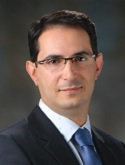Overview
Pathways to Developing Personalized Treatment Regimens for Patients with Advanced Melanoma
Advanced Melanoma Pathfinder
Click the"View Activity" button to view this activity.
View ActivityCME/CE is no longer available for this activity
• Apply best practices in appropriate selection of anti-LAG-3 immunotherapy combinations for advanced melanoma, taking into account clinical trial findings, guidelines, and patient characteristics
• Enhance the role of the multidisciplinary care team in the monitoring, management, and mitigation of adverse events associated with anti-LAG-3 combination therapy
• Review rationale for use of anti-LAG-3 inhibitors for the treatment of advanced melanoma

Completion of this activity, including the pretest, posttest, and follow-up assessments, qualifies as a medium weight MIPS improvement activity under MACRA and can be claimed as completion of IA_PSPA 28 of an Accredited Safety or Quality Improvement Program in the Quality Payment Program. Clinicians should submit their improvement activities by attestation via the CMS Quality Payment Program website. You will receive additional information after completing the activity and receiving your certificate via email.
 | Hussein Tawbi, MD, PhD (Chair) Professor, Department of Melanoma Medical Oncology Division of Cancer Medicine The University of Texas MD Anderson Cancer Center Houston, TX |
 | April Salama, MD (Faculty) Associate Professor of Medicine Medical Oncology Director of the Melanoma Program Duke Cancer Institute Duke University School of Medicine Durham, NC |

The Academy for Continued Healthcare Learning is accredited by the Accreditation Council for Continuing Medical Education (ACCME) to provide continuing medical education for physicians.
Nurse practitioners may participate in this educational activity and earn a certificate of completing as AANP accepts AMA PRA Category 1 Credits™ through its reciprocity agreements.

